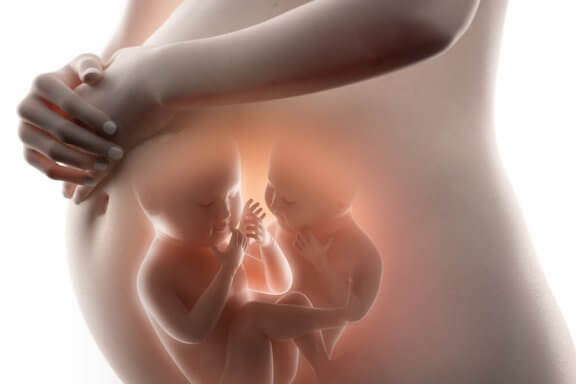4 Special Care Tips for Multiple Pregnancies

It’s important for women with multiple pregnancies to be aware of the associated risks. This is a special type of pregnancy that requires more care and attention from mothers-to-be, as well as many visits to their OB.
If you have a multiply pregnancy, it’s important to commit to taking care of yourself and guarantee your babies’ and your own health.

Special care for multiple pregnancies
Multiple pregnancies demand extra attention because the human body is prepared for just one gestation. Therefore, being pregnant with two or more babies can become a complication.
Below we’ll offer important advice to consider.
Better nutrition
You need to take in more calories than what’s needed for a single pregnancy. There’s also a bigger need for iron, proteins, and other nutrients. Likewise, women with multiple pregnancies will have higher weight gain and, obviously, this depends on your body mass. Your OB will suggest a healthy weight gain plan.
More bed rest
Usually, during the first trimester of multiple pregnancies, there’s a lot of bed rest for the mother-to-be. Then, after the third trimester, absolute rest is recommended.
This allows the babies to keep inside the belly as long as possible. Likewise, this helps them gain enough weight and grow enough for good development.
Regular prenatal care
In multiple births, the risk for complications is higher. Therefore, you need to go to the doctor more often. Maybe your OB will schedule an appointment every 15 days in your first trimester. Further on, you’ll probably need to see them once a week.
Pay attention to symptoms in multiple pregnancies
In the case of multiple pregnancies, women usually experience regular symptoms but more intense. Typical symptoms include dizziness, nausea, and vomiting.
It’s possible to get gestational diabetes and high blood pressure. Therefore, you need to follow your doctor’s instructions and go to every checkup.

Medical treatments for multiple pregnancies
Your doctor will determine the right treatment for you according to your medical history and tolerance to different treatments and therapies. Likewise, they’ll take into account the number of fetuses and evolutionary expectations for the multiple births.
Fetal and maternal analysis
These are studies and analysis that a doctor will suggest to control the fetuses’ and the mother’s health.
Medical referrals
In most multiple births, the OB will suggest going to see a perinatologist. They’ll manage the fetuses’ normal development and determine if there are anomalies or complications through a series of analysis or special ultrasounds.
Cervical cerclage
This procedure sutures the cervix’s opening. Usually, it’s performed on women with an incompetent or weak cervix.
In other words, it’s difficult to keep it open during pregnancy. Besides, many women may need cervical cerclage if they have more than two fetuses. In this case, it happens at the start of the pregnancy.
“During the first trimester of multiple pregnancies, moms-to-be are prescribed with a lot of bed rest. Then, after the third trimester, they’re recommended absolute rest.”
Meds with corticosteroids
Since most babies are born premature, mothers receive corticosteroids. This way, the fetus’ lung process is already on the way in case there’s premature birth.
They can be taken orally, through IV line, or intramuscular injections. Magnesium sulfate is highly popular.
Common complications in multiple pregnancies
As previously mentioned, there’s a high risk for complications in multiple pregnancies. For example, there’s the threat of miscarriages, or having anemia, or placenta abruption.
There can be hemorrhages, fetal malformations or, on rare occasions, fetal death at one point in the pregnancy.

Types of multiple pregnancies
Usually, these are classified into three groups:
Monozygotic twins
In this case, there are two babies form the same zygote. They’re formed from a single cell.
Dizygotic twins
It happens when two spermatozoa fertilize two eggs at the same time. This produces two babies from two different zygotes.
Triplets, quadruplets, quintuplets, or sextuplets
Although rare, these cases have increased in recent decades because of different techniques of assisted fertilization.
Today, thanks to the technological and medical progress, and the information we now have, there are higher probabilities for successful multiple pregnancies.
It’s important for women with multiple pregnancies to be aware of the associated risks. This is a special type of pregnancy that requires more care and attention from mothers-to-be, as well as many visits to their OB.
If you have a multiply pregnancy, it’s important to commit to taking care of yourself and guarantee your babies’ and your own health.

Special care for multiple pregnancies
Multiple pregnancies demand extra attention because the human body is prepared for just one gestation. Therefore, being pregnant with two or more babies can become a complication.
Below we’ll offer important advice to consider.
Better nutrition
You need to take in more calories than what’s needed for a single pregnancy. There’s also a bigger need for iron, proteins, and other nutrients. Likewise, women with multiple pregnancies will have higher weight gain and, obviously, this depends on your body mass. Your OB will suggest a healthy weight gain plan.
More bed rest
Usually, during the first trimester of multiple pregnancies, there’s a lot of bed rest for the mother-to-be. Then, after the third trimester, absolute rest is recommended.
This allows the babies to keep inside the belly as long as possible. Likewise, this helps them gain enough weight and grow enough for good development.
Regular prenatal care
In multiple births, the risk for complications is higher. Therefore, you need to go to the doctor more often. Maybe your OB will schedule an appointment every 15 days in your first trimester. Further on, you’ll probably need to see them once a week.
Pay attention to symptoms in multiple pregnancies
In the case of multiple pregnancies, women usually experience regular symptoms but more intense. Typical symptoms include dizziness, nausea, and vomiting.
It’s possible to get gestational diabetes and high blood pressure. Therefore, you need to follow your doctor’s instructions and go to every checkup.

Medical treatments for multiple pregnancies
Your doctor will determine the right treatment for you according to your medical history and tolerance to different treatments and therapies. Likewise, they’ll take into account the number of fetuses and evolutionary expectations for the multiple births.
Fetal and maternal analysis
These are studies and analysis that a doctor will suggest to control the fetuses’ and the mother’s health.
Medical referrals
In most multiple births, the OB will suggest going to see a perinatologist. They’ll manage the fetuses’ normal development and determine if there are anomalies or complications through a series of analysis or special ultrasounds.
Cervical cerclage
This procedure sutures the cervix’s opening. Usually, it’s performed on women with an incompetent or weak cervix.
In other words, it’s difficult to keep it open during pregnancy. Besides, many women may need cervical cerclage if they have more than two fetuses. In this case, it happens at the start of the pregnancy.
“During the first trimester of multiple pregnancies, moms-to-be are prescribed with a lot of bed rest. Then, after the third trimester, they’re recommended absolute rest.”
Meds with corticosteroids
Since most babies are born premature, mothers receive corticosteroids. This way, the fetus’ lung process is already on the way in case there’s premature birth.
They can be taken orally, through IV line, or intramuscular injections. Magnesium sulfate is highly popular.
Common complications in multiple pregnancies
As previously mentioned, there’s a high risk for complications in multiple pregnancies. For example, there’s the threat of miscarriages, or having anemia, or placenta abruption.
There can be hemorrhages, fetal malformations or, on rare occasions, fetal death at one point in the pregnancy.

Types of multiple pregnancies
Usually, these are classified into three groups:
Monozygotic twins
In this case, there are two babies form the same zygote. They’re formed from a single cell.
Dizygotic twins
It happens when two spermatozoa fertilize two eggs at the same time. This produces two babies from two different zygotes.
Triplets, quadruplets, quintuplets, or sextuplets
Although rare, these cases have increased in recent decades because of different techniques of assisted fertilization.
Today, thanks to the technological and medical progress, and the information we now have, there are higher probabilities for successful multiple pregnancies.
This text is provided for informational purposes only and does not replace consultation with a professional. If in doubt, consult your specialist.








